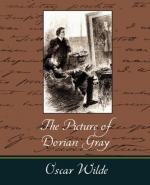The thing was still seated in the chair, straining over the table with bowed head, and humped back, and long fantastic arms. Had it not been for the red jagged tear in the neck and the clotted black pool that was slowly widening on the table, one would have said that the man was simply asleep.
How quickly it had all been done! He felt strangely calm, and walking over to the window, opened it and stepped out on the balcony. The wind had blown the fog away, and the sky was like a monstrous peacock’s tail, starred with myriads of golden eyes. He looked down and saw the policeman going his rounds and flashing the long beam of his lantern on the doors of the silent houses. The crimson spot of a prowling hansom gleamed at the corner and then vanished. A woman in a fluttering shawl was creeping slowly by the railings, staggering as she went. Now and then she stopped and peered back. Once, she began to sing in a hoarse voice. The policeman strolled over and said something to her. She stumbled away, laughing. A bitter blast swept across the square. The gas-lamps flickered and became blue, and the leafless trees shook their black iron branches to and fro. He shivered and went back, closing the window behind him.
Having reached the door, he turned the key and opened it. He did not even glance at the murdered man. He felt that the secret of the whole thing was not to realize the situation. The friend who had painted the fatal portrait to which all his misery had been due had gone out of his life. That was enough.
Then he remembered the lamp. It was a rather curious one of Moorish workmanship, made of dull silver inlaid with arabesques of burnished steel, and studded with coarse turquoises. Perhaps it might be missed by his servant, and questions would be asked. He hesitated for a moment, then he turned back and took it from the table. He could not help seeing the dead thing. How still it was! How horribly white the long hands looked! It was like a dreadful wax image.
Having locked the door behind him, he crept quietly downstairs. The woodwork creaked and seemed to cry out as if in pain. He stopped several times and waited. No: everything was still. It was merely the sound of his own footsteps.
When he reached the library, he saw the bag and coat in the corner. They must be hidden away somewhere. He unlocked a secret press that was in the wainscoting, a press in which he kept his own curious disguises, and put them into it. He could easily burn them afterwards. Then he pulled out his watch. It was twenty minutes to two.
He sat down and began to think. Every year—every month, almost— men were strangled in England for what he had done. There had been a madness of murder in the air. Some red star had come too close to the earth. . . . And yet, what evidence was there against him? Basil Hallward had left the house at eleven. No one had seen him come in again. Most of the servants were at Selby Royal. His valet had gone to bed.... Paris! Yes. It was to Paris that Basil had gone, and by the midnight train, as he had intended. With his curious reserved habits, it would be months before any suspicions would be roused. Months! Everything could be destroyed long before then.




